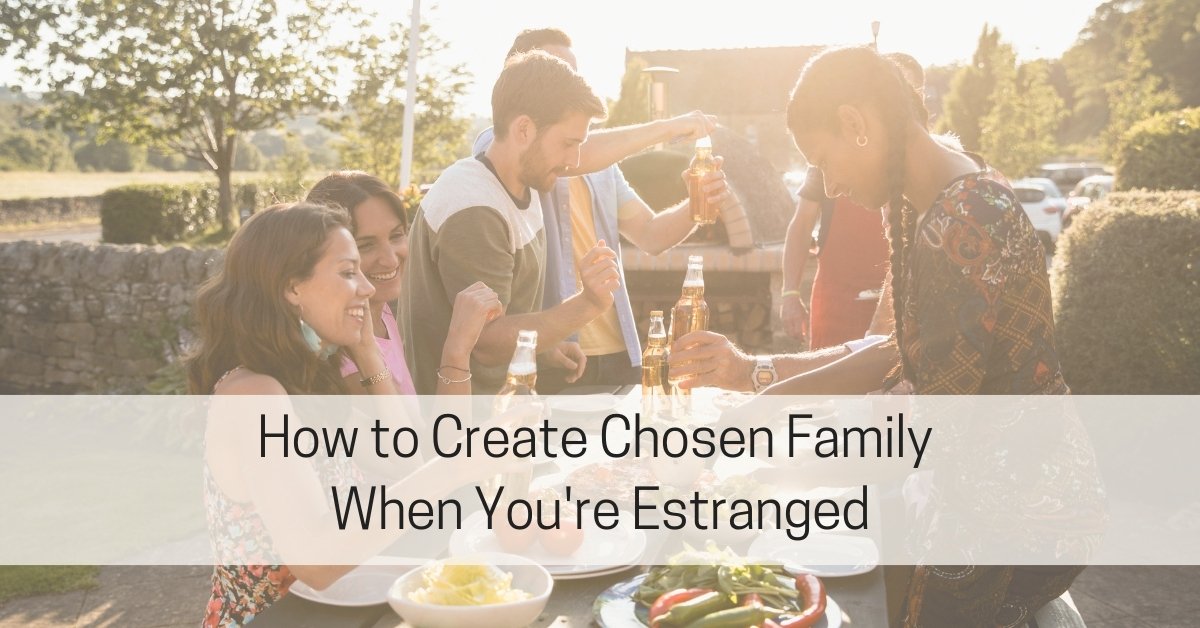Estranging yourself from family is a profoundly painful experience. Adult children go no contact, or reduce contact, with family members for many reasons, including abuse (emotional, physical, or sexual), conflicting values, or a lack of acceptance regarding their identity. It’s a difficult decision, even when it’s the right one for your well-being. Creating a “chosen family” can help you not only cope, but thrive.
Estrangement can also be a chance for you to redefine what family means. It’s an opportunity to create a chosen family, a community of people who provide mutual respect, love, and understanding. A chosen family can be just as meaningful, or even more so, than those with biological or legal ties.
In this article, I’ll discuss the benefits of a chosen family, including how it can help you heal from the effects of childhood trauma and abusive or toxic family members, and some ways to overcome barriers to creating a chosen family.
The Benefits of a Chosen Family
Supportive and validating relationships foster belonging, boost emotional well-being, and offer hope and healing. As I explain in Cutting Ties with Your Parents, “A chosen family helps fill the void left by family estrangement. Chosen families may spend holidays together, go on vacation together, provide practical support, and act as a safety net. Some chosen families live together, and some do not. Some chosen families maintain a traditional family structure and use titles, such as mom or brother, to refer to each other. Others resemble a group of close friends” (Martin, 2024, p.90).
Creating a chosen family is also empowering as it allows you to redefine what family means. You can cast off unhealthy expectations and dynamics from your family of origin. This allows for healthier interactions and the ability to set boundaries that support your personal growth and happiness.
Healing Through Your Chosen Family
Your chosen family can be a source of deep healing, offering the emotional support and stability you may have lacked in the past. Healthy relationships can help you with reparenting—giving yourself the love, validation, and encouragement you may not have received as a child. Experiencing kindness, empathy, and consistency can gradually heal emotional wounds and increase your self-worth.
Healthy communication and problem-solving within your chosen family can also aid healing. These relationships provide a safe space for you to practice expressing your needs, resolving conflicts, and developing communication skills—all essential for healthy relationships. Learning to set and respect boundaries reinforces the idea that relationships should be based on mutual care, not obligation.
Over time, these positive experiences reshape your understanding of relationships, showing you that love and connection can be nurturing, not harmful.
Challenges Building a Chosen Family
Even when you recognize the benefits of creating a chosen family, it isn’t necessarily easy. You may have internalized the societal belief that traditional family relationships are the most important. This can create confusion and guilt as you prioritize connections outside your family of origin.
You’ll also need to be vulnerable and trust others, which can be difficult after experiencing abuse, betrayal, rejection, or indifference in your family of origin. Understandably, you may be hesitant to trust others and open up after these experiences.
Finding people who share your values and offer genuine support takes time and effort. You’ll likely need to step outside your comfort zone, try new social settings, and tolerate some discomfort or even rejection along the way.
Tips for Building Your Chosen Family
The following list was adapted from Cutting Ties with Your Parents (Martin, 2024).
- Clarify what you’re looking for. What kind of support do you need (practical, emotional, or social)? What qualities do you value in relationships? How do you imagine your chosen family interacting and spending time together (shared meals, holidays, or just knowing they’re there for you)?
- Cast a wide net and be open to connecting with people of diverse backgrounds and ages.
- Join groups or activities related to your values (not just your hobbies). Connecting with others who share your values has the potential for more meaningful relationships.
- Initiate conversations. Many people dislike small talk, but it’s how all friendships begin.
- Gradually share more about yourself.
- Show genuine interest and offer support to others.
- Set healthy boundaries. Communicate your limits clearly and respect the boundaries of others.
- Be patient. Building a chosen family takes time.
Final Thoughts
Family estrangement is undoubtedly difficult, but it’s also an opportunity for you to redefine what family means to you and who is a member of your family.
Creating a chosen family is a powerful act of self-care and love. By intentionally building relationships based on mutual respect, love, and understanding, you can create a support system that nourishes your authentic self and helps you thrive.
Learn more in my book Cutting Ties with Your Parents, which is available from most book retailers. And be sure to sign up below for free, supportive self-help tools.
If you’re taking space or estranged from a parent, sign up for free supportive resources.
©2025 Dr. Sharon Martin, LCSW. All rights reserved. Photos courtesy of Canva.com.
“For anyone realizing that their path to healing might require creating distance from parents who’ve caused harm – you’re not alone. This workbook offers both compass and companion for that complex journey.” – Annie Wright, LMFT
Articles You Might Like
Publisher: Source link






